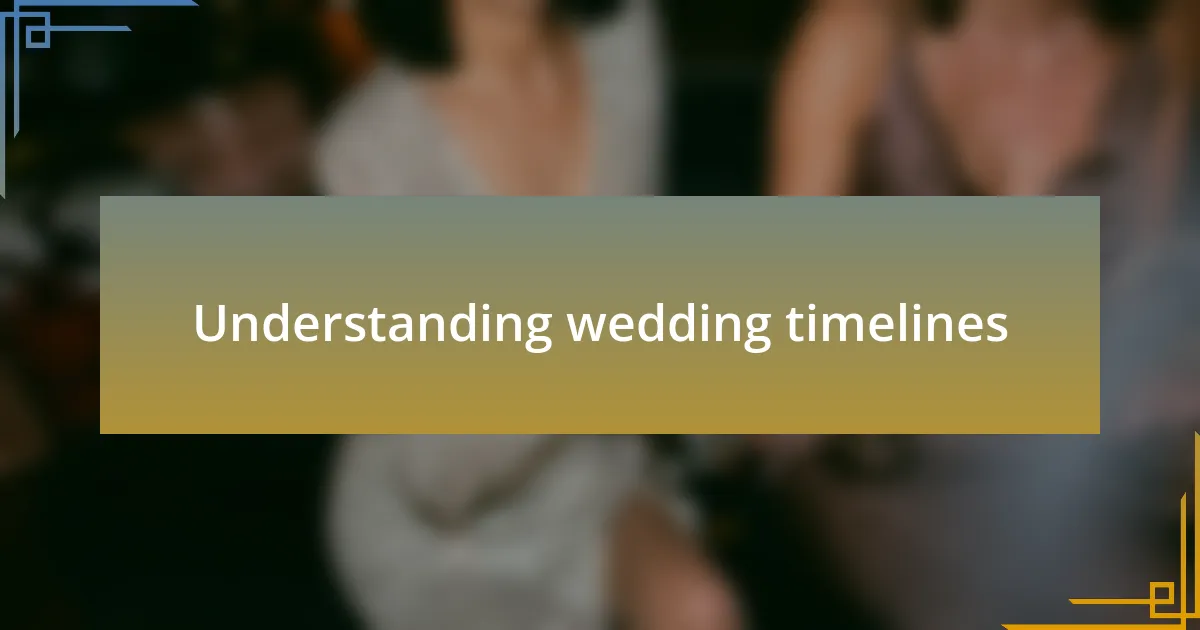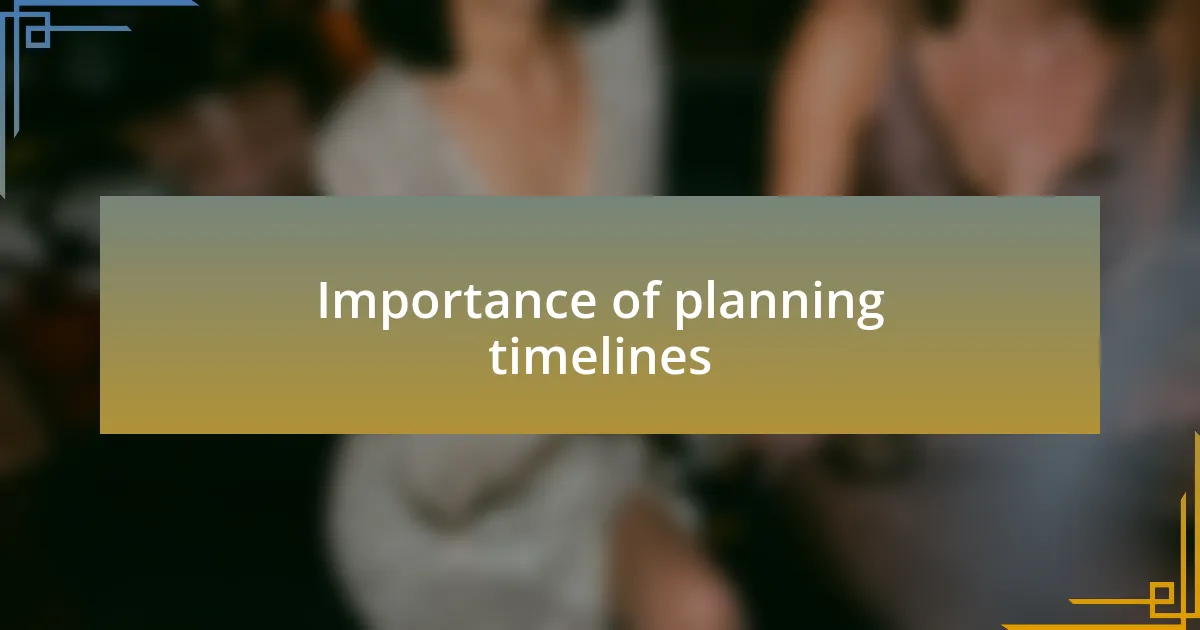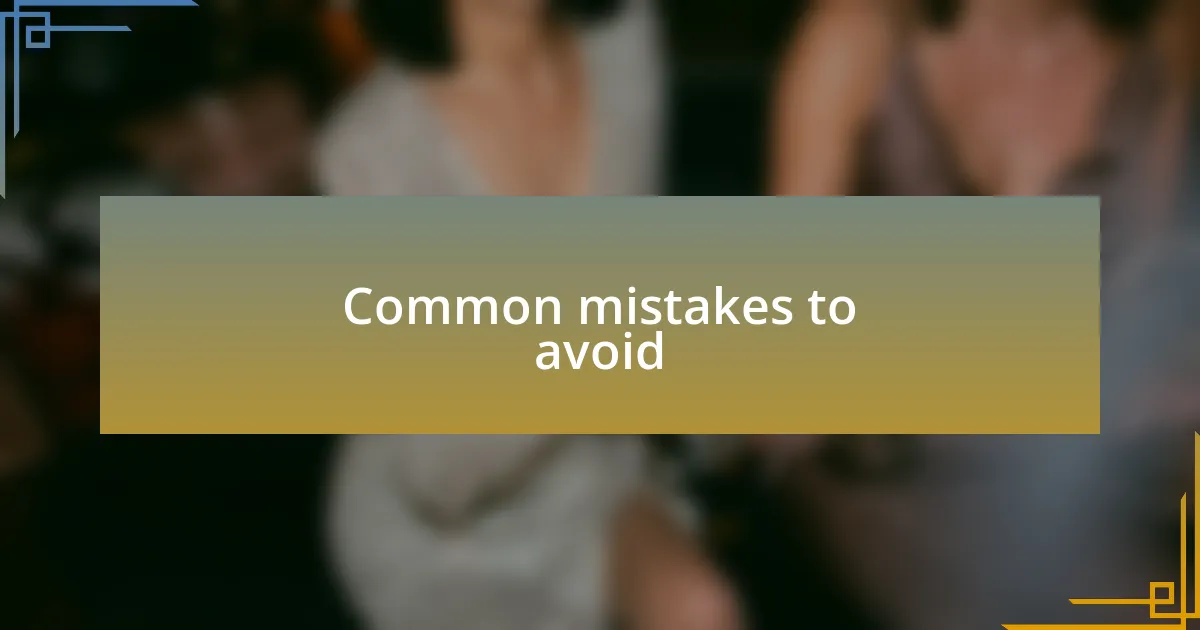Key takeaways:
- Creating a wedding timeline is essential for ensuring a smooth and enjoyable day, allowing for flexibility and spontaneity.
- A well-structured timeline helps manage potential delays, reduces stress, and ensures clear communication among vendors.
- Personalizing the timeline with unique moments reflects the couple’s love story and enhances guest experience.
- Gathering feedback from key participants and conducting a rehearsal can significantly improve the execution of the planned timeline.

Understanding wedding timelines
Understanding wedding timelines is crucial for ensuring that the big day unfolds smoothly. I remember feeling overwhelmed while planning my own wedding, but when I finally mapped out a detailed timeline, it all clicked into place. Think about it—what moments are most important to you? Prioritizing those experiences helps shape a wedding day that truly reflects your love story.
Each wedding is unique, and timelines should cater to individual needs and preferences. I once attended a wedding where the timeline was so tight that it felt rushed, and guests barely had time to savor the moment. Have you considered how your timeline can enhance the enjoyment of your day? By allowing flexibility for unexpected moments, you create space for spontaneity and connection.
Creating a timeline is like crafting a beautiful melody; it requires attention to both harmony and rhythm. I learned to balance ceremony durations, cocktail hours, and reception activities to avoid an overwhelming pace. How does your ideal wedding sound? As you build your timeline, remember to weave in moments for laughter, love, and perhaps those fleeting glances that make it all worthwhile.

Importance of planning timelines
Planning timelines for a wedding is essential because it serves as a roadmap for the entire day. I recall attending a friend’s wedding where the timeline was meticulously crafted, allowing everything from hair and makeup to the first dance to flow seamlessly. When you have a clear timeline, it not only reduces stress but also ensures that everyone knows where to be and when, ultimately leading to a more enjoyable experience for all.
Moreover, a well-structured timeline serves as a tool for managing potential hiccups. I experienced a minor issue when a vendor was running late, but because we had allotted buffer time in the schedule, the wedding still felt relaxed rather than chaotic. Have you thought about how small adjustments in your timeline can accommodate surprises like this? By keeping an eye on time while also allowing for wiggle room, you give yourself the gift of peace of mind.
Finally, a thoughtfully arranged timeline can elevate the overall atmosphere of your celebration. There’s something special about knowing that each moment is cherished; for instance, during my wedding, having specific times for toasts and special dances highlighted the importance of those experiences. How can you ensure your guests do not miss any treasured moments? A well-planned timeline turns a wedding into a series of memorable events, rather than just a collection of activities.

Common mistakes to avoid
One common mistake I frequently see couples make is underestimating the time needed for key moments, like hair and makeup. I remember when a close friend decided to skip a trial run, thinking it would save time. Unfortunately, it took longer than expected, and we were all scrambling to get her ready for the ceremony. Have you considered how critical those precious minutes can be?
Another pitfall is neglecting to include buffer time for unexpected delays. At one wedding I attended, the photographer was late, which pushed everything back. To avoid this, I suggest building in extra time between activities for things you can’t control. How relaxed would your day feel if you had that cushion?
Lastly, not communicating the timeline with your vendors is a mistake that can lead to confusion and chaos. During my wedding, we assumed the florist knew the order of events, but that wasn’t the case. Sharing the timeline ensured all the key players were on the same page, which ultimately made for a smoother event. Have you thought about how clear communication could transform your big day?

Personalize your wedding timeline
Creating a personalized wedding timeline is essential for ensuring the day unfolds smoothly. I recall crafting a timeline for my sister’s wedding, where we accounted for her love of personalized touches. By mapping out moments like a dedicated time for a special first look with her dad, we created a memory that was both beautiful and deeply meaningful. Have you thought about the little details that truly reflect your unique love story?
In my experience, flexibility is key. When I planned my own wedding, I designated specific time slots for key events but also left some open-ended periods where we could just be in the moment. I remember the joy of the impromptu dance session that broke out after dinner—those spontaneous memories often become the highlights of the day. Isn’t it these unplanned moments that often leave the biggest impressions?
Don’t forget to consider your guests’ experience when personalizing your timeline. At a wedding I attended, the couple included activities that represented their hobbies, allowing guests to mingle and enjoy themselves rather than feeling like mere bystanders. I felt a sense of connection to both the couple and the celebration. Have you considered how your timeline can invite your loved ones into the narrative of your day?

Finalizing your successful timeline
When finalizing your wedding timeline, it’s crucial to gather feedback from all key players involved, such as your partner, wedding planner, and immediate family. I learned this during my best friend’s wedding planning; we all had different ideas about the schedule, but having an open conversation helped us find a common ground. Have you had similar experiences where collaboration made all the difference in your plans?
It’s also essential to create a buffer between events. I once witnessed a wedding where the couple rushed between the ceremony and reception due to tight scheduling. That feeling of chaos is something I never want anyone to experience. Think about how much more enjoyable it is when there’s breathing room to savor each moment, don’t you agree?
Don’t overlook the importance of a dry run or rehearsal to ensure everyone is on the same page. I remember how a simple walk-through before my cousin’s wedding brought us all together and calmed the nerves. With everyone knowing their role and timing, the day itself flowed seamlessly. How reassuring would it feel to know that every detail is just as you envisioned?